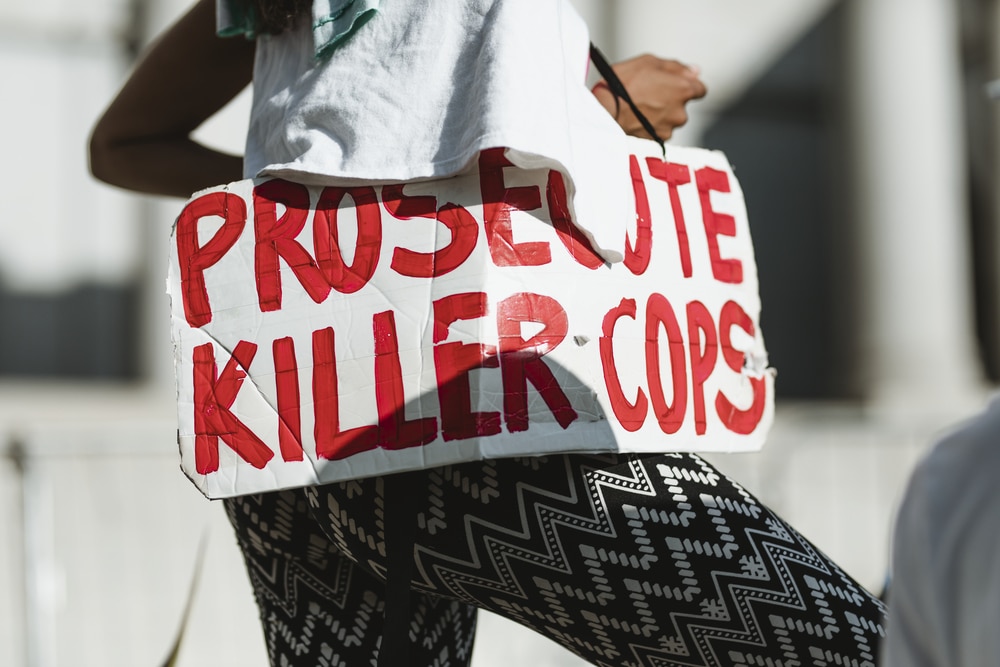Just over three years ago, in the wake of George Floyd’s murder by police in Minneapolis on May 25, 2020 , riots erupted across America and protests even emerged in Europe. Time may not heal all wounds, but it can give perspective. And now may be an opportunity to suggest realistic police reforms to restrict further militarization of police and circumscribe the authority of police within boundaries we can accept.
Rescind the Doctrine of Qualified Immunity
Qualified immunity is the judicial doctrine that states that government officials cannot be sued for infringement of civil rights unless they have violated “clearly established law.” The courts have interpreted this phrasing in such a narrow way that police officers have been found to have immunity from civil suits unless a case can be cited with the exact same circumstances and where a law enforcement officer was found liable.
This interpretation has, in large part, protected law enforcement from accountability for almost any abuse of citizens in the context of performing their duties as law enforcement officers. This protection opens the door to police believing they can be as violent as they choose without consequence and elevates law enforcement officers to a position where they are permitted by law to act in a manner that would be criminal if done by any other citizen.
Eliminating qualified immunity should bring law enforcement back in line with the rest of us, where they will be accountable if they dispense violence disproportional to the threat they face. The truth is, even without qualified immunity, law enforcement officers, like all government officials, are given wide latitude and deference by the courts. They certainly do not need the extra layer of protection offered by qualified immunity. The prospect of facing accountability will always mitigate behavior.
Restore the Right to Resist
The right to resist unlawful arrest in the United States has its roots in English Common Law. The right to resist unlawful arrest is similar to the protection against unlawful searches and seizure of property codified in the Fourth Amendment to the U.S. Constitution. William Norman Grigg wrote about the case of Julius Holmes and his appeal to state courts which resulted in the overturning of his conviction for manslaughter.
To summarize, a police officer arrived at Holmes’ house, without a warrant, to arrest him for a misdemeanor charge filed by his landlady the previous day. Holmes, a black man, refused to be arrested, though offered to go to court the following day if presented a summons. The first officer called for assistance, and Holmes threatened the police officers (both of whom were white) with a knife before fleeing from his home with a shotgun. A local white citizen was shot and killed by Holmes when he joined the police pursuit.
From the court’s opinion:
“When the policemen went into the defendant’s house to arrest him without a warrant, they were trespassers in a double sense—trespassing upon the sacred right of personal liberty, and trespassers upon the right of domicile. The defendant had a legal right to resist both trespasses, and to use in resistance as much force as necessary to make that resistance effective.”
The ruling concluded that, likewise, if Julius Holmes had killed one of the arresting officers, it would have been an act of justifiable homicide; and if one of the officers had killed Holmes, it would have been a criminal act. Here’s the kicker: This case was settled in a heavily segregated Georgia in 1908, just two years removed from the Atlanta race riots of September 1906.
The remarkable thing about this case is that the right to resist was considered an indispensable right for all people—regardless of race, color, or creed—to have the ability to defend themselves against arbitrary exercise of authority.
Revoke Civil Asset Forfeiture
The Fifth Amendment to the U.S. Constitution states that no person “shall be deprived of life, liberty or property without due process of law.” Civil asset forfeiture is an (extra-) legal process through which police may seize property, including money and other assets, by alleging that the property was used in commission with or gained as the result of a crime. The owner does not need to be convicted or even arrested.
Ending this practice would reduce opportunities for proactive policing and corruption related to revenue generation by law enforcement. Allegations of criminal activity should not be sufficient, and are, in fact, an unconstitutional justification for law enforcement agencies to seize property with little recourse for the accused.
End the Drug War
Similarly, the U.S. government’s War on Drugs has provided a tremendous wellspring for proactive policing, interfering with otherwise peaceful people to find out if they are breaking the law. Additionally, there are more than 5,000 SWAT raids each year, including “no-knock” raids. The “no-knock” raids were expressly devised to deal with drug offenses to prevent disposal. All of these practices result in explicitly antagonistic interactions between police and citizens.
An end to the drug war would result in fewer check-and-see style crime-seeking operations by police and a reduction in raids that too frequently end in violence. Other benefits to ending the War on Drugs are that it would decriminalize voluntary economic exchanges and would enable addiction to be treated as a medical, rather than criminal, affliction.
End the Terror Wars
In 1997, the U.S. Department of Defense started the modern military equipment sharing program with civilian law enforcement, the 1033 Program. Through the program, nearly every federal and civilian law enforcement agency in the United States has stocks of military weapons and vehicles.
The list of military stock in the hands of civilian law enforcement and federal agencies is absurd, to the point where a Sand Diego school was granted a mine-resistant vehicle. This program has contributed immensely to the militarization of police in this country. Just the visual difference between the old representation of Officer Friendly and today’s police in full body armor, holding submachine guns and looking like a paramilitary organization, should be enough to give people pause.
Soldiers coming home from wars and military occupations in the Middle East and joining law enforcement has also contributed to the problem. I’m sure it’s difficult for veterans to shed the perception that everyone on the other side is an enemy. However, I suspect giving military equipment to non-veteran members of police forces that don’t have the discipline of their military counterparts has had a greater impact on police violence, as they go out and play soldier with all of that fancy equipment.
A moral society cannot be maintained in a constant state of war.
Penetrate the Blue Wall of Silence
Somewhat counterintuitively, this is the hardest thing to change. Previous points an all be changed by government action. The ‘Blue Wall of Silence’ is a cultural issue, deeply embedded in law enforcement. Over and over, good cops speaking out against the bad behavior of their coworkers have been harassed by their fellows and pushed out of their departments or out of law enforcement altogether. The officers willing to speak out against their friends and fellow law enforcement officers when they witness illegal and/or unethical acts should be rewarded, rather than punished. The incentives are backwards. If you eliminate all of the good, honest, ethical officers, what is left?
There are many problems with law enforcement and the legal system in the United States. However, the recommendations above would have a definitively positive effect on law enforcement and mitigate the violence between law enforcement and citizens. Through these actions, accountability would be restored. Protections would be provided against arbitrary power. Opportunities for corruption and the number of antagonistic interactions with law enforcement would be reduced. And, the government would show a real effort being made to restore the integrity and the image of law enforcement agencies.































